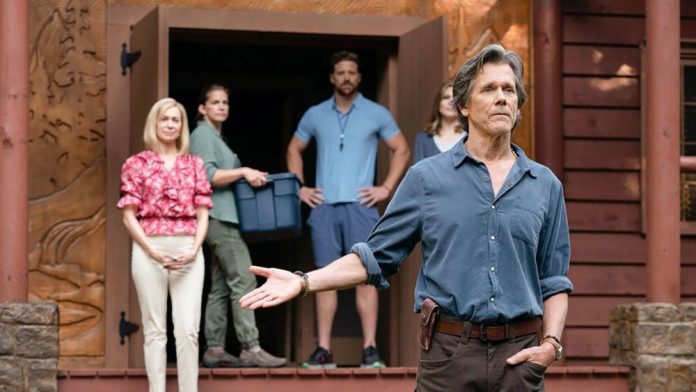Kevin Bacon is the quintessential renaissance man. He’s an actor, and he’s a musician and singer in a band with his brother Michael, appropriately named The Bacon Brothers. He’s the subject of a silly game that will forever haunt him, although being six degrees from Bacon feels like an honor these days. Above all else, Bacon likes to work, and it’s the gigs in between acting that fuel his creative energy, be it as a producer or a director.
According to his IMDB filmography, he’s acted in 103 movies, directed seven, and to date has either executive produced or co-produced 12 films. Of the latter discipline, the most recent projects he helped bring to fruition include Tremors, The Following, the Peacock original movie They/Them, and Season 3 of Showtime’s drama series City on a Hill, all of which he also acted in, receiving both above and below-the-line credits.
Above the Line recently spoke with Kevin Bacon via Zoom from his home in California, where he lives with his wife Kyra Sedgwick and their menagerie of farm animals, including miniature horses, pigs, Alpacas, and Pygmy goats he got as an anniversary gift for Sedgwick, which you can sometimes see him serenading on his Twitter feed.
Looking very casual and relaxed in an oversized baseball hat with a goat logo emblazoned on the front and large, square black-framed glasses, Bacon discussed what drives him as an artist and how he decides to get involved in a project behind the camera. As a director, he is attracted to casting, no matter how small the role is, and he’s also into needle drops, given his musical talent. Bacon also expressed his respect for the crew and discussed his experiences on the set of The River Wild, where a stunt double handled the tough stuff.
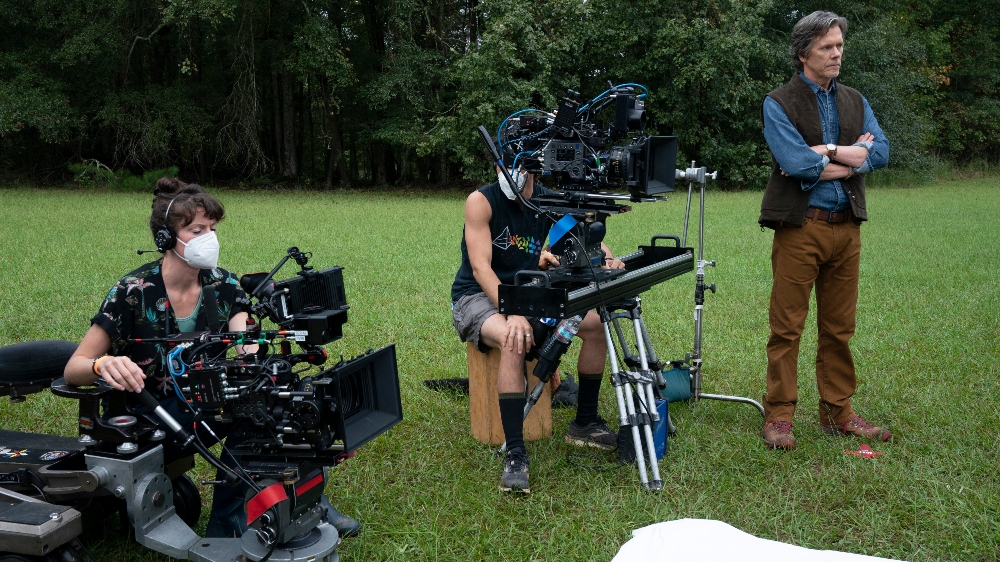
Above the Line: What do you think is the job of a producer?
Kevin Bacon: It’s a great question and it’s a word that is thrown around an awful lot, for a whole lot of different jobs. Sometimes it is truly creative. Sometimes it’s somebody who has invested a few bucks. Sometimes it’s someone who is a real nuts-and-bolts person, making deals with crews and locations. From my point of view, when I either ask for or are given it [a project to produce], it comes with two things; number one, a seat at the table in terms of all decisions surrounding production — those being casting, script, locations, schedule, [and[ whatever issues may come up. It also is a responsibility. It’s a way of saying, ‘I’m willing to be a little bit more than a hired hand and take responsibility for this.’ That’s how it functions, for me.
ATL: Also, you’re putting your name behind it. Did you ever start a production company?
Bacon: I have a production company, Mixed Breed Films, which I’ve had since the ’80s. In fact, it sort of started during the time in the late ’80/early ’90s where people at the studio were kind of handing out these production deals. It was a way of having a relationship with talent. I lived on the East Coast but I had an office on the West Coast, on the Columbia lot. I had an assistant. I had a head of development. I found, ultimately, it was fun and interesting to work on, but that kind of producer is a producer who has a thousand balls in the air and one of them gets made. I just didn’t have the time or bandwidth to focus on [producing] in that kind of way. In a way, I’m sort of coming around to possibly exploring that idea again.
ATL: Is producing a bit more attractive given the nature of how acting work can be so inconsistent?
Bacon: Whether you call it a producer or not, the one thing I learned and I wished I really had focused on a little bit more when I was younger was [the importance of] generating your own material. It can be a very frustrating life when you sit there and wait for the phone to ring. You can whine about not reading good scripts or getting the parts that [you] want or whatever, but if you really start to approach it from, ‘what do I want to do?’ and ‘have I read any books that are interesting? Do I have any initial original ideas that could be developed?’
We spend a lot of time between gigs and people who aren’t in the business, they think of it like we’re on vacation, and it’s kind of the opposite because when you are out of work, at least, for me, I’m very hungry for work. It’s baked into my life’s DNA that being out of work is not a good place to be; to get the next thing going before it all comes crashing down. I’m developing something now and as soon as we finish [this interview] I’ll work on it, going through the script and making notes and thinking of new ways to do it.
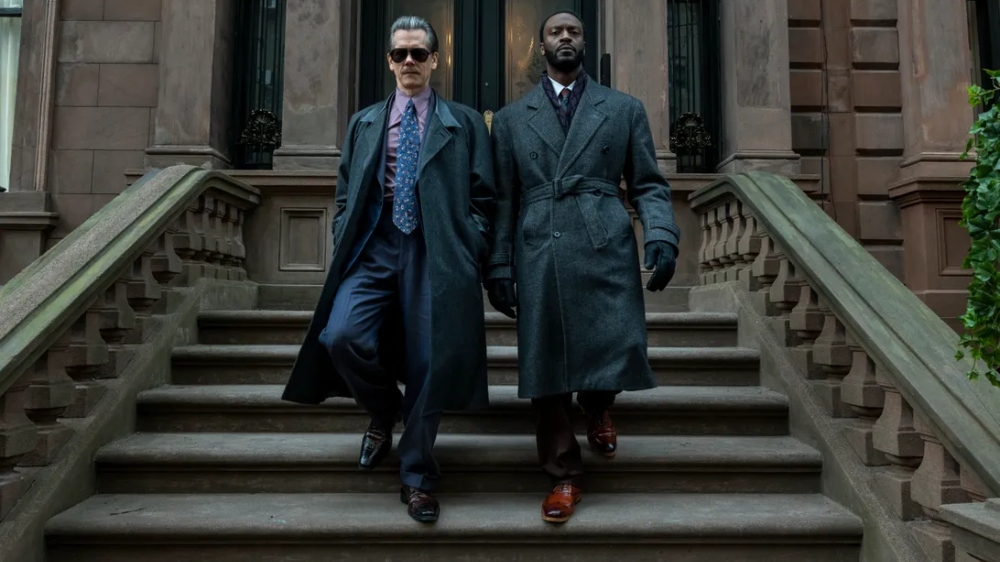
ATL: Do you think this is a good practice for actors to live by?
Bacon: When I speak to young actors these days, I really do pound the table on it. My daughter (Sosie Bacon) is an actress and she has written a short and [is] getting ready to film it. When I started out, the ability to do that was very limited because it would mean that you’d need enough money. You hear the stories of people maxing out their credit cards in order to get a super 16 camera and a Nagra to be able to shoot something and then edit it. Nowadays, [if] you have a phone, you can make a movie. So I encourage young people to do that and just produce their own material and see what happens.
ATL: What was the first thing you ever produced?
Bacon: Wild Things might’ve been the first. I directed a couple of things that Kyra [Sedgwick] produced. Losing Chase was the first for Showtime but I don’t think I was a producer on that. In retrospect, it was a pretty unusual thing for a very young woman to do what it is that we’re talking about, but she really got into the producing thing way before I did. I came on Wild Things as a producer. I saw something in that screenplay that I think a lot of people didn’t. I think it was a divisive piece of material so when I came on board, I said, ‘can I help to kind of get this thing going?’
ATL: Let’s break it down to the departments that you liaise with mostly, especially on City on a Hill, and how you like to bring the band together, so to speak.
Bacon: I really love [City on a Hill], and especially during the pandemic, I really like the casting piece of it. If you’re talking about a TV series, and especially with City on a Hill, every episode there’s going to be new cast members. New characters are written all the time and they’re probably going to last for one or two episodes besides the core group of actors who are already on the show. Our casting directors will usually read, for any given part, maybe 20-30 people. Even the pizza delivery guy who says, “is this for you,?” You’re honing it down to maybe five or six for each role. We’ll go through, individually, all of the tapes.
When I started out, there was no self-tape and now it seems [to be] the only way. There are some Zoom auditions but they tend to be mostly self-tapes and people are getting very good at it, where they have home systems with good backgrounds [and] wireless microphones. I really like going through actor after actor because the small parts really become the essentials to the fabric of the show in a really, really important way. They can separate something that is “eh, [and] not so great” with something that really kind of hits you. I’m always so impressed and touched and moved by the amazing talent pool of New York-based actors — faces you’ve never seen who just come in and kick ass. I love actors and I love to watch them work.
ATL: Jill Hennessy is so great as your wife on that show.
Bacon: I love Jill. She’s killing it on City on a Hill and this season she’s got all kinds of crazy stuff going down, so it’s great.
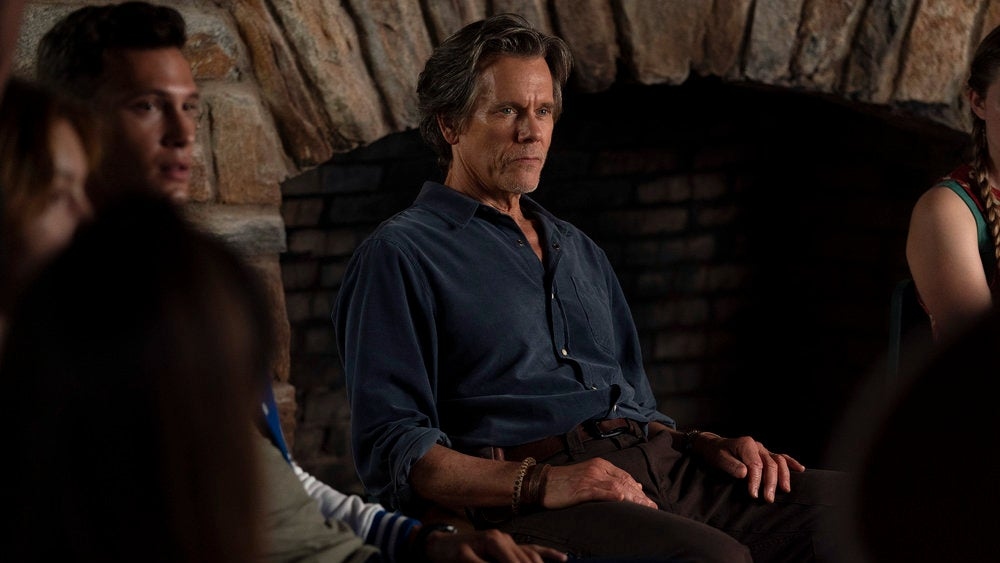
ATL: Do you have favorite go-to crews that you like to work with?
Bacon: I find that I’m generally most interested in the camera crew. I’m always thinking about directing, which is always in the back of my head. I’m fascinated by angles and lenses, and lighting. I’m a geek in that way. I just worked on a commercial spot about a month ago and there was a new piece of gear that I’d never seen before and I was so excited to tell people about it, and they were like, “that’s great, whatever. You know.” [laughs] Although I don’t interface [with them] as much as an actor/producer as I would as a director, but the production design and art departments are also really fascinating to me because personally, I like design. If I wasn’t an actor or a musician, I’d probably be a decorator.
ATL: Does that come from your father Edmund Bacon’s background as an architect?
Bacon: My dad was trained as an architect. He ended up not doing too much individual design because he became more of a city planner. But he was, and that’s kind of a part of me. I like color, furniture, and all that kind of stuff. When directing, I get more involved in that. We have our City on a Hill stage sets like Jackie’s house [and] DeCourcy’s office, which stay pretty much the same from a design standpoint. As a director, you’re finding new locations that haven’t been seen in the show before. You’ll look at three different drugstores and what is it that works or is almost there, like a counter that is on the right as opposed to on the left.
What’s really fun about that, also, from a structural point of view, is you also have to think about how these locations and these sets and production design interfaces with what you’re dreaming of in terms of shots. If you want to come around this corner with a Steadicam but it’s too tight, you have to make those adjustments. I love that stuff.
ATL: What did you direct for City on a Hill?
Bacon: City on a Hill, I’ve only directed one episode (the Season 2 premiere), but this season, I didn’t get a chance with our sort of closed-down pandemic version of the show. For Season 3, we broke it up into two-episode blocks, so each director did two episodes, which is kind of great, in a way. But doing two episodes in a row for me, and being on the show, was just a little overwhelming with the pandemic, and also, frankly, on the basis of exposure. It would’ve made me a little bit more exposed, and [then] you’re running one of the risks that myself or one of the principles gets sick, and then you have to shut the whole thing down, which is a real drag.
ATL: As a director, do you have a cinematographer who you favor?
Bacon: Not really. They all bring something very different to the table. I haven’t been enough of a steady director to have found one person [who] I would always want to be with. Television is interesting in that the cinematographers are incredible. When you have a movie, you have a schedule [and[ you just seem to have more time to plot out what you’re going to do. On a television series, it’s so fast and furious and [each] day, the page count is so long that the cinematographer has to be a great lighter, great shooter, and also fast, and be able to turn around quickly.
The interesting piece of it is when you have a director coming in for an episode, the relationship between a director and a producing director and a cinematographer is very complicated and needs time to grow and nurture. A lot of that coming together often happens during pre-production. However, on a TV series, you have almost no time to get used to being with your cinematographer. They have to adjust a lot to a new director. You have this unit, which is the crew and the cast, and we all work with a tight, cohesive bond that can grow and become really strong. Then you have a stranger kind of coming in and trying to tell you how you do it. That’s a very tricky thing, especially for cinematographers to navigate. I’ve seen cinematographers handle that really well and some get easily frustrated. In a lot of ways, I don’t blame them. TV shooter’s is a tough gig.
ATL: Can you take us down memory lane and talk about some of the experiences you’ve had with below-the-line folks that stand out for you.
Bacon: I’ve had so many great interchanges and exchanges, and what always amazes me, pretty much across the board, is everybody has so much integrity about the work that they do. Everybody in every department is so focused on that thing. Prop people will get so excited about the fact that they were able to find the actual ’90s vintage Dunkin’ Donuts cup that changed [in] 1992, [but] they found it. I just love that kind of stuff. I just eat it up. I have a tremendous amount of admiration for stunt people and the problem-solving that goes into making stunts work. In that case, you’re not only telling the story to make it cool and fun and real, it’s also a question of safety, which is obviously job one. So, the way that is handled.
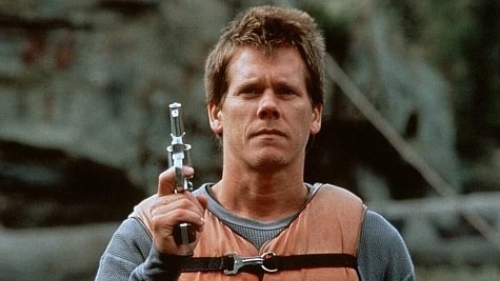
ATL: What do you remember about watching your stuntman in The River Wild handle those rapids?
Bacon: It was terrifying, I’m not gonna lie. What was interesting in that case was that we had stuntmen who were great Hollywood stuntmen, courageous and willing to take it all on. But we also had the river guys and they were there, initially, sort of as backup in a way, and also as a rescue team off on the side of the rapids, hidden out of the camera in kayaks [and] ready to go out and pull us out of the water. Believe me, we had to have that many, many times! They ended up being more skilled in that kind of water. [Working in] that kind of water is not something you learn in stunt school; actually navigating a boat and making it work down the rapids. So, my double for a lot of it was not a trained stuntman. He was called a river rat. He was a guy who would spend his time going to the Andes and finding rivers in South America and Africa — an adventurer.
Way before you could do anything with digital facial work, they had created a mask of my face and put it on the stunt guy to go over a piece of rapid, a small waterfall. He had my face on! I looked at the shot after in the dailies and it was pretty much useless because the face had no expression on it. So there’s all this crazy water flying around and paddling like crazy and my face is just this frozen deadpan expression. It didn’t really work. [chuckles] The rigging crew was also amazing because they rigged cameras over the water to work remotely. We had all kinds of crazy stuff on that one. It was a blast.
ATL: As a musician, do you get involved with the needle drops?
Bacon: I remember back on The Following, that was cool. In the very first episode, there was a Marilyn Manson cover of “Sweet Dreams” by Annie Lennox, a very creepy, dark, metal-based cover. It was cool because it was a cover that was known but not hugely well-known and it was the last song. I said, ‘this is really working and we should keep doing this.’ The fun was finding these dark metal covers to end the episodes. I love finding music.
Also, in City on a Hill, the episode that I directed, the first episode of the second season where you first see Jackie opening up and he’s driving and doing coke; the usual thing. He’s got a new ride. We went through so many songs (but landed on “Jesus Is Just Alright” by The Doobie Brothers). It had to be right. The needle drop thing is fun in finding the right song where the lyric is also reflective of what’s going on, but not too much [of a] nail on the head because then it feels cheeseball to me. You want something that evokes an era but on the other hand, there are songs that are just so played out to me, like if you have a ’60s movie, you play Creedence. You want to find something that hits that sweet spot and puts people in the right headspace for that scene.
ATL: It seems like a no-brainer for you to write a soundtrack.
Bacon: I’m not a composer. My brother Michael does that for a living. That’s not my thing. I’ve often tried to write songs for movies. In fact, we revisit a song in our (Bacon Brothers) set that I wrote. I was doing a movie many, many years ago in the desert called Beneath Perfection. I thought that was a really cool title for a song and was also indicative of how I was feeling about myself at the time. [chuckles]
So I wrote this song “Beneath Perfection” and my dream was they would hear the song and want to put it in the movie and both would become massive hits. But none of those things happened. Part of the reason was they changed the title of the movie to Tremors. I should’ve wrote a song called Tremors but that didn’t feel like a song to me.
I wrote a few songs (“Medium Rare”) for Telling Lies in America, where I played a corrupt DJ, which actually made it into the movie, which was a really fun process. It took place in the early ’60s and I was writing in a very specific style, which was early R&B like The Drifters or The Platters. The song had to have a certain chord structure and instrumentation, so that was really fun to try to write in a specific historical style.
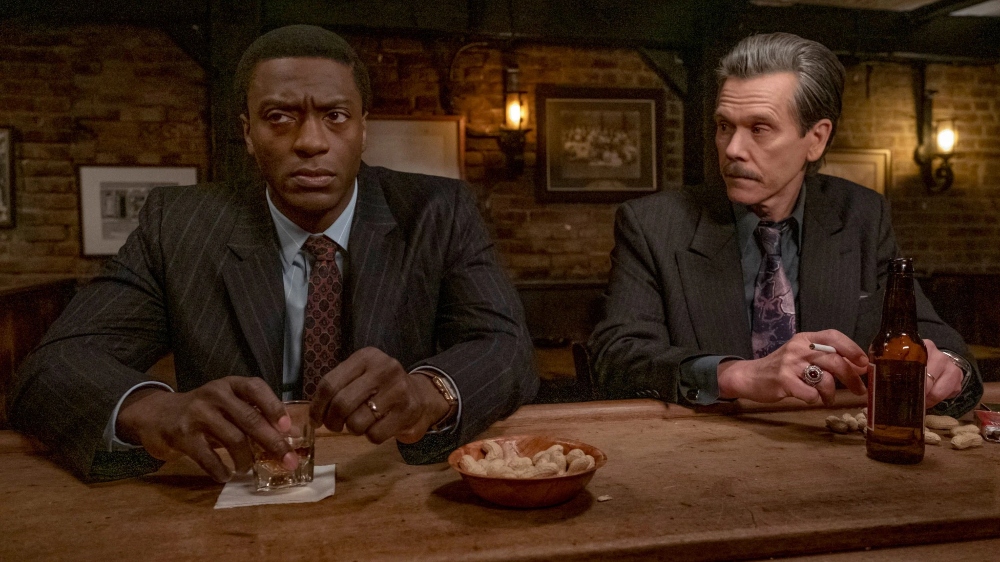
ATL: Of all the below-the-line disciplines, what do you value the most?
Bacon: When I look out at crew, I think that everybody works incredibly hard, despite the recent backlash of how many hours they work, which had gotten completely out of hand. People do it because they like the feeling of making something and the feeling that your job is constantly changing. You’re in a new location, you’re shooting mornings… and now you’re shooting nights. You’re creating something from the ’90s… and now it’s futuristic, or [it] has lots of special effects. You’re constantly being stimulated in terms of the work. You kind of have to love making movies and TV to do it because it is hard work, and I’d say the hardest gig in entertainment is the hour-long television drama. Listen, digging ditches, [that’s] hard work, no doubt about it. But these people work incredibly hard.
ATL: So the $10,000 question is: How come you have been overlooked by the Emmys and the Oscars thus far, and do awards even matter to you at this point?
Bacon: In answer to the first part, there’s only one reason why I’m being overlooked. The reason why somebody doesn’t get nominations or whatever in my opinion is the voters don’t vote for you. I’m a member of both the Television Academy and the Oscars so I know you go, you see things, and you vote.
In terms of mattering to me; it matters to me to the extent that I think those types of things can present opportunities, which is all I want — to do the thing that I love to do, which is act. I’m doing pretty well without any kind of award recognition so I don’t want to complain too much. If somebody is putting an important movie together, you know that what they really love when they start marketing the movie, “starring Oscar winner” is a big piece of it. It sometimes makes getting those gigs a little bit easier, but listen, I’m doing fine.
They/Them is now streaming on Peacock, while Season 3 of City on a Hill is currently airing on Showtime.


